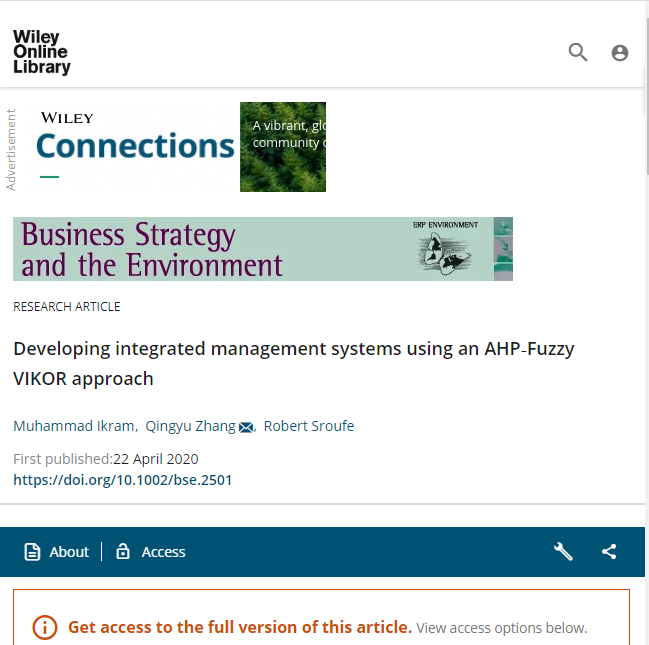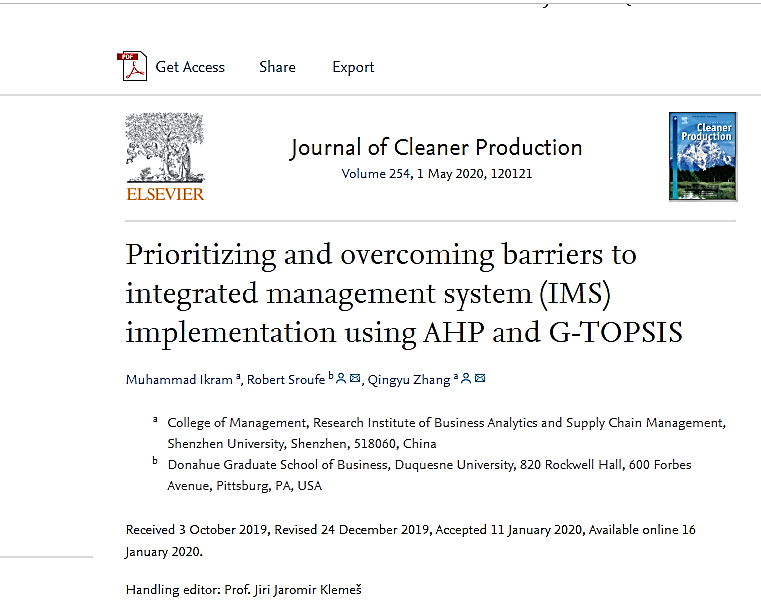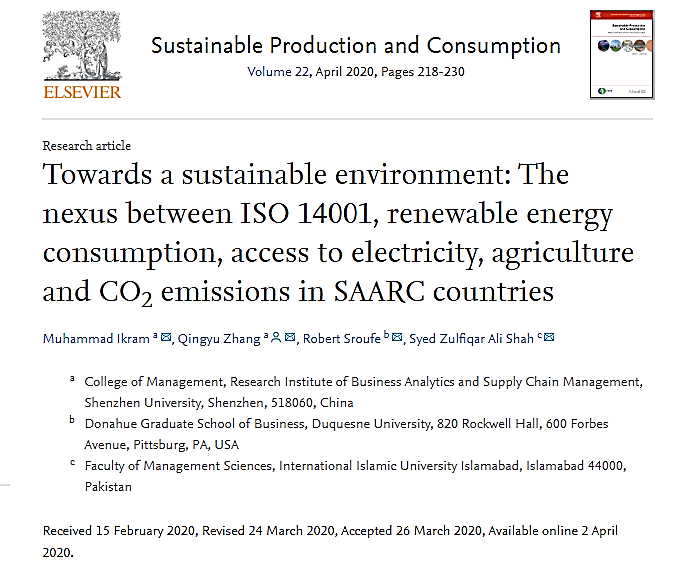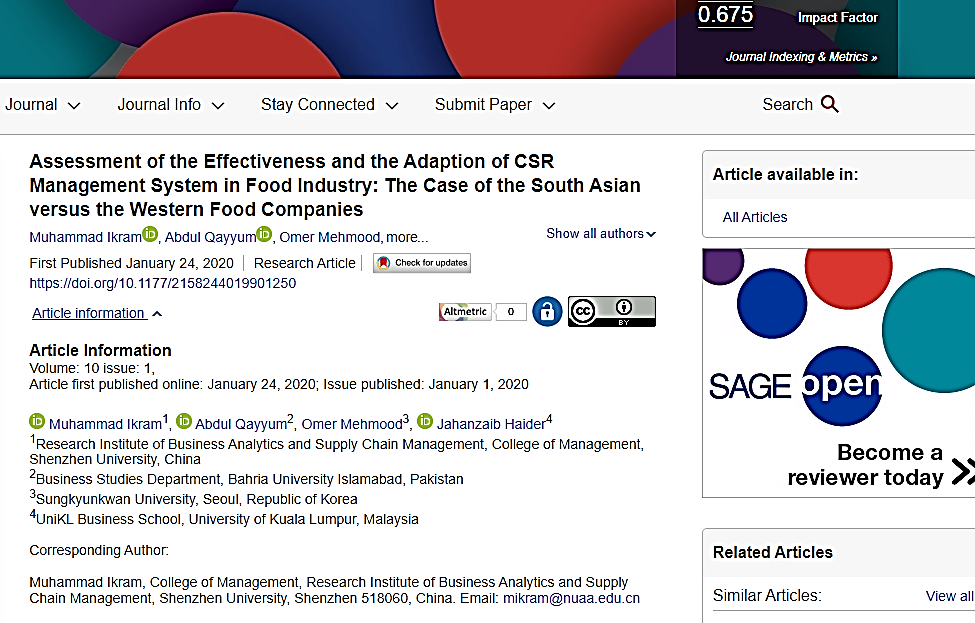As a first authorDr. Muhammad Ikram (Sardar), hired as a Postdoctoral researcher at college of Management, has been published multiple articles on high quality leading academic journals such as “Business Strategy and the Environment” (Wiley) indexed in SSCI (JCR level 1) having 6.381 impact factor. Journal of Cleaner Production (Elsevier) indexed by SCI (JCR level 1) having 6.395 impact factor. Sustainable Production and Consumption indexed by SSCI& SCI. Dr. Ikram has also published an article on a new emerging journal SAGE Open indexed by SSCI (JCR level 3) having 0.657 impact factor. Dr. Ikram is also Article’s Editor of SAGE Open Journal. His research interests include Corporate Social Responsibility (CSR), Corporate Sustainability, Integrated Management System (IMS), Grey Modeling and energy.
1.Business Strategy and the Environment
Business Strategy and the Environment(BSE) is the leading academic journal in its field with peer-reviewed contributions of a high-quality having Ranking: 2018:10/147 (Business)8/116 (Environmental Studies)14/217 (Management).
Abstract:
Integrated management systems (IMSs) involve a strategy to manage multiple systems while meeting the needs and expectations of stakeholders. There are various management standards used for the development of IMS. This study aims to undertake research focused on how to develop an IMS. In this context, management standards, including the International Organization for Standardization (ISO) and Global Reporting Initiatives (GRI), consider alternatives and integration potential at multiple levels (i.e., strategic, tactical, and operational). We assess criteria including continuous improvement, systematic management, integration, organizational learning, standardization, and ability to cut through bureaucracy before a deeper dive into 28 subcriteria. We then use an analytical hierarchy process (AHP) approach to prioritize the main criteria and subcriteria. Next, we include the use of fuzzy VlseKriterijuska Optimizacija I Komoromisno Resenje (F‐VIKOR) methods to prioritize alternatives. The contributions of this study reveal that systematic management and standardization are the most influencing criteria among six guiding principles. The ISO standard and GRI are the most suitable standards for the development of dynamic IMS. This study is the first of its kind to prioritize guiding principles of IMS. The outcomes of this study will assist business managers, organizations, and policymakers in their decision making regarding management standards for IMS development as well as improve sustainable business practices. Researchers will find new IMS insights and constructs for further empirical investigation.

2.Journal of Cleaner Production (Elsevier)
TheJournal of Cleaner Productionis an international, transdisciplinary journal focusing on Cleaner Production, Environmental, and Sustainability research and practice.
Abstract
The implementation of Integrated Management Systems (IMS) has become a prerequisite for any organization looking to transform itself into a competitive and more sustainable enterprise. However, these efforts are not successful for some organizations, and there is an opportunity to explore what it takes to have an effective IMS implementation. Prior studies attribute several barriers to implementation. Yet, little is known about the degree to which these barriers impede implementation. To fill this gap in the literature, we have developed a systematic framework to prioritize barriers. We first identify and classify barriers using a literature review and modified Delphi method providing twenty-six barriers categorized under six main categories. These included Resources and Management, People, Implementation, Economic, Social & Legal and Cultural. Next, we used Analytical Hierarchical Process (AHP) to calculate weights and rankings of barriers and sub-barriers. We then take this process a step further by using a Grey preference by similarity to ideal solution (GTOPSIS) methodology to further prioritize alternatives. The results reveal the implementation and social & legal barrier categories ranked highest among major categories. Overall rankings showed that the economic and implementation sub-barrier is more important than the other twenty-four sub-barriers within different categories. The contributions of this study provide new insights regarding levels of integration and employee motivation as important to overcoming barriers to implementation. Finally, a sensitivity analysis checked the robustness of the proposed research framework that could be implemented to overcome the IMS barriers. This study is the first of its kind to organize barriers of IMS in this way. The outcomes of this study will assist organizations and policymakers in their decision making regarding IMS implementation while simultaneously improving sustainability practices. Researchers will find new IMS implementation insights and constructs for further empirical investigation.

3.Sustainable Production and Consumption
Sustainable production and consumption can be defined as production and use of products and services in a manner that is socially beneficial, economically viable and environmentally benign over their whole life cycle. SPC is index by SSCI & SCI.2018 Cite Score 4.19 andtop quartile journalinfour Scopus categories(Industrial and Manufacturing Engineering, Environmental Engineering, Environmental Chemistry,andRenewable Energy, Sustainability and the Environment)
Abstract
In this study, we investigate complex, country-level relationships between ISO 14001 certification, renewable energy consumption, access to electricity, agriculture, and CO2 emissions within the South Asian Association for Regional Cooperation (SAARC) countries. These countries are important to look at they contain 20% of the world's population, are investing in infrastructure, and are vulnerable to the impacts of CO2 emissions. There is a gap in the literature addressing all of these countries while using novel modeling to try and understand dynamic relationships across countries. In this study we use multiple models to examine data covering the years 2000 to 2014 starting with novel Grey Relational Analysis (GRA) models to compute the weights and ranking of countries based on CO2 emission. Next, using a Conservative (maximin) model, we check which country has the most CO2 emission issues among all countries based on weights obtained by Second Synthetic Grey Relational Analysis (SSGRA). Finally, a Grey preference by similarity to ideal solution (G-TOPSIS) methodology prioritizes the factors that have more intensely impact CO2 emissions. The results reveal that among all SAARC countries, India has substantial CO2 emission issues. We also find reductions in emissions from renewable energy consumption and the adoption of ISO 14001 certification in these countries. The outcomes of this study can assist organizations and policymakers in their decision-making and investments regarding CO2 reduction while simultaneously improving environmental sustainability practices.

4.SAGE Open (SAGE)SAGE Openis a peer-reviewed, "Gold" open access journal from SAGE that publishes original research and review articles in an interactive, open access format. Articles may span the full spectrum of the social and behavioral sciences and the humanities.
Abstract
The purpose of this empirical study is to undertake a comparative analysis of the South Asian and Western food companies based on their corporate social responsibility (CSR) adoption and impact on firm performance. We conducted a survey of 24 South Asian and 20 Western companies. Later, we performed independent samples t-tests and ordinary least squares (OLS) regression. Furthermore, we applied Kingdon’s agenda and green consumer theories to explain how CSR in Western food companies could be advanced than the food companies in South Asia. Based on the aforementioned tests, the Western food companies obtained better scores than their counterparts in South Asia. This result was obvious as the West has a developed CSR management system compared to South Asia. However, this is interesting that we found a weak CSR performance link between the Western and the South Asian food companies. The lower CSR adoption levels of South Asian food companies show their greedy nature as these companies are hesitant to spend the portion of their profits on promoting CSR. South Asian governments with a vested interest in improving CSR performance provide tax breaks and other motivations for increasing CSR adoption among food companies. These findings have theoretical and practical implication for future research.



